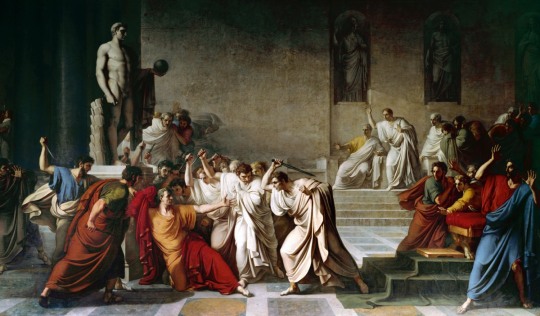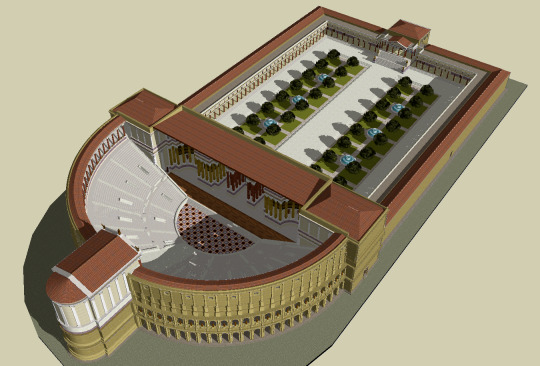#Divus Julius
Text


Denarius with head of Augustus wearing oak wreath (obverse) and comet with eight rays and inscription Divus Julius (reverse)
Roman (possibly minted at Caesaraugusta, modern Zaragoza in Spain), Imperial Period, 19-18 B.C.
silver
British Museum
#I love the coins of Augustus with representations of Caesar's Comet#I linked to the Wikipedia page if you want more info#denarius#Augustus#Julius Caesar#Caesar#Caesar's Comet#Divus Julius#Roman Empire#Augustan Period#Imperial Period#silver#coin#numismatics#British Museum
176 notes
·
View notes
Text
Just reread Suetonius' Divus Iulius, and I can't decide what my favorite part is:
Suetonius claims Caesar was involved in seven conspiracies to overthrow the republic before he even became consul. Five of these incidents appear to have been made up, one of them happened while Caesar was on the other side of the Mediterranean, and the last (Catiline's conspiracy) would have required Caesar to sabotage his own career by overthrowing the government he'd just been elected to as praetor.
Suetonius' Caesar is somehow able to terrorize the Senate as an aedile despite not having an army or Clodius-like urban mob, and being constantly on the run from debt collectors.
After getting command of Transalpine Gaul, Caesar tells the Catonians the equivalent of "Suck my dick, assholes!" one of them snaps back with "Pretty hard to do for a woman," and Caesar's like "I don't know, ever hear of the Amazon warriors?"
I don't know if this is supposed to imply the Amazons were trans, or into pegging, or what, but it's such a weirdly specific exchange (yet so very Caesar) that I have to wonder if it was real.
Suetonius writes all kinds of shit about Caesar, says "Yeah, he had the assassination coming"...and then titles the whole thing "The Divine Julius."
Most of Divus Iulius is based on real events, but often they've been warped or taken out of context, or Suetonius isn't critical enough of the biases in his sources. He's a super fun read, highly recommended, but don't take anything he says at face value.
I think the underlying issue is that Suetonius decided what Caesar's character was like and then framed events in a way to support that interpretation. He does try to give credit for Caesar's positive qualities and acts, but the chronological portion of the narrative overwhelmingly creates a very specific image of a power-hungry and extravagant man who'd been gunning to overthrow the republic from day one.
Many of the personal criticisms of Caesar's character also fall into a standard pattern of Roman invective, in which adultery, debt, "passive" homosexuality and expensive tastes become metaphors for a man's lack of integrity, honor, and self-control, and ultimately make him a threat to the state. (Cf. the similar criticisms Sallust alleges of Catiline, and Cicero levels at Antony, Clodius and others.) I do think at least some of Suetonius' portrayal is true, but it's hard to know how much was figurative or exaggerated.
I'm as happy to criticize Caesar as anyone, especially for the Gallic Wars and the demise of free elections. He did a lot of fucked-up stuff! He absolutely fucked up the republic! But I don't think he sought to become dictator until just before the civil war broke out, and I don't think he intended to keep the job for life until 46 or 45. A man can change a lot over 55 years - sometimes for the worse.
#jlrrt reads#suetonius#divus iulius#julius caesar#nsfc (not safe for cato)#passive homosexuality here means 'the receiving partner in anal'#that's the romans' prejudice not mine#jlrrt essays
21 notes
·
View notes
Text
From now on, I'm writing big tumblr posts in Google docs first. Writing long posts right into tumblr is only a bit better than writing a longfic right into ao3. I accidentally posted the second day of Julius Caesar (thank god it was done) when I just wanted to save it. I thought I had deleted all those hours of work. I need to take a bath, read a book, and go to sleep to recover from the emotions I just experienced.
6 notes
·
View notes
Photo

The banana peel who changed the course of History (Original)
#Ides of March#Ides de Mars#15/03#March 15#15 Mars#Caius Iulius Caesar IV#Imperator Iulius Caesar Divus#Jules César#Julius Caesar#καὶ σύ τέκνον#Et tu Brute?#Marcus Junius Brutus#Gaius Cassius Longinus#Decimus Junius Brutus Albinus
6 notes
·
View notes
Text
suetonius randomly blurting out that whenever augustus got sick he liked to stay at maecenas’s home over anything else..............why the fuck would you say that suetonius. why.
#personal#that's just like#so weirdly wholesome#this man was so cold and pragmatic and borderline ruthless even with people he LIKED#but he gets sick and the only thing he wants is to go be with his friend and sit in his gardens to make him feel better#this man had three hundred enemies SACRIFICED on the altar to divus julius#but he was also such a fucking homebody#like it's so bizarrely sweet that this was a habit he had whenever he became ill#just went to his best friend's house to recover and then hung around his gardens
1 note
·
View note
Text
I am reading “Divus Julius” from Suetonius’ The twelve caesars” because it’s the main source for my final thesis. It’s really funny in Latin and Suetonius spends the entirety of chapter 49 calling Caesar a bottom. I decided to consult the most popular English translation (A. Thomson) to make sure I was translating all the metaphors correctly and I flip to chapter 49. Nothing. The dude has omitted that chapter and that capter only. The only chapter in which Caesars relationship with Nicomedes is described in detail. Currently fuming.
#bi Caesar rights#dark academia#light academia#literature#books and libraries#chaotic academia#poetry#studyblr#books#art#dark acadamia aesthetic#classical literature#classics#classical studies
4 notes
·
View notes
Text

Jean-Léon Gérôme - The Death of Caesar
English: Julius Caesar was assassinated in Rome on the Ides of March (March 15), 44 BC. Characteristically, Gérôme has depicted not the incident itself, but its immediate aftermath. The illusion of reality that Gérôme imparted to his paintings with his smooth, polished technique led one critic to comment, "If photography had existed in Caesar's day, one could believe that the picture was painted from a photograph taken on the spot at the very moment of the catastrophe."
Italiano: Giulio Cesare è stato assassinato a Roma alle Idi di Marzo (15 Marzo 15), 44 a.C. Gérôme dipinse non il fatto in se, ma i momenti immediatamente seguenti. L'illusione di realtà che Gérôme infonde ai suoi dipinti con la propria tecnica morbida e pulita portò alcuni critici a commentare, "Se la fotografia fosse esistita al tempo di Cesare, si potrebbe credere che il quadro fosse dipinto in base alla foto presa sul luogo nel momento della catastrofe."
Depicted people
Julius Caesar
Marcus Junius Brutus
Depicted place Theatre of Pompey
Date between 1859 and 1867
https://commons.wikimedia.org/wiki/File:Jean-L%C3%A9on_G%C3%A9r%C3%B4me_-The_Death_of_Caesar-_Walters_37884.jpg
Artist Jean-Léon Gérôme (1824–1904)
Title The Death of Caesar

The Death of CaesarA vivid portrait of one of history’s most momentous conspiracies.
History Today | Published in History Today Volume 69 Issue 7 July 2019
A huddle of conspirators walks away from the lifeless, bloodied body of Julius Caesar, having stabbed the great Roman general and statesman 23 times on the Ides, or 15th, of March, 44 BC.
Caesar had recently been declared dictator perpetuo by a Senate fearful of its rumoured abolition in a series of reforms by Caesar, who had a substantial following among Rome’s Plebeians. Senators, of whom Cassius and Brutus were most prominent, had formed themselves into a grouping, the Liberatores, in an attempt to restore the Republic.
Caesar had recently announced his impending departure on a military campaign to subdue the Parthian Empire. If action was to be taken by the conspirators, now was the moment.
The setting for Caesar’s assassination was to be the Theatre of Pompey, where Brutus had organised a series of gladiatorial contests, to which he had invited the dictator. Caesar had been warned of various plots on his life, but Brutus persuaded him that the Senate would be disappointed if he did not attend. His ally Mark Antony, similarly suspicious, tried to intervene, but he was detained outside the theatre by the plotter Servilius Casca.
On his arrival, Caesar was presented with a petition by Lucius Tillius Cimber for the return of his exiled brother. When Caesar refused, Cimber manhandled Caesar, pulling down his toga. As Caesar cried ‘this is violence’, Casca thrust a dagger at his neck – and then the mob struck. Blinded by the torrent of blood that poured from his wounds, Caesar fell on the steps of the Curia.
His last words have been subject to centuries of speculation. He did not say the Shakespearean ‘Et tu, Brute’, but he may have uttered, as the Roman chronicler Suetonius claimed, ‘You too, child’.
The conspirators headed for the Capitol but were met by a bewildered, fearful crowd, who began a destructive fire. Civil war followed and the conspirators, led by Cassius and Brutus, were defeated at the Battle of Philippi in Macedonia in 42 BC by forces under the command of Mark Antony and Caesar’s nominated successor, Gaius Octavius, who became the Emperor Augustus Caesar. Augustus declared his predecessor a god – Divus Iulius – the same year.
The Death of Caesar, by Jean-Léon Gérôme, was painted for the Exposition Universelle of 1867, held in Paris. It hangs in Baltimore’s Walters Art Gallery.
+
4 notes
·
View notes
Photo

*#empiresofmen #monsterunderthebed #romanempire #jesusthechrist #thetrueemperor* http://ChristianityOriginal.com/Emperor In 42 BC, Julius Caesar was formally deified as a god "the divine Julius" (divus Iulius) after his assassination. His adopted son, Augustus (27 BC - 14 AD, during the decades just before Jesus started his ministry) thus became known as divi filius (son of god). Augustus Caesar, promoted himself as the Son of God by means of propaganda (Eg. *Coins)* through the ends of the Roman Empire, including the Roman-occupied nation of Israel. 'At daybreak the council of the elders of the people, both the chief priests and the teachers of the law, met together, and Jesus was led before them. “If you are the Messiah,” they said, “tell us.” Jesus answered, “If I tell you, you will not believe me, and if I asked you, you would not answer. But from now on, the Son of Man will be seated at the right hand of the mighty God.” *They all asked, “Are you then the Son of God?”* He replied, “You say that I am.” Then they said, “Why do we need any more testimony? We have heard it from his own lips.” Then the whole assembly rose and led him off to Pilate. And they began to accuse him, saying, *“We have found this man subverting our nation. He opposes payment of taxes to Caesar* and claims to be Messiah, a king.” Luke 22:66-71; 23:1-2.
0 notes
Text
roman senate: dude we've gotta stop caesar, hes trying to become a god! we cant let that happen we've gotta kill him.
*they kill him*
*two years later*
Rome: yo here's our new god Divus Julius.
0 notes
Text
I only bought The Twelve Caesars just so I can stan over the Julio-Claudians. Specifically Augustus, because, you know, that man was pretty.
#The Twelve Caesars#Suetonius#Ancient Rome#Gaius Julius Caesar#Divus Julius#Augustus#Tiberius#Caligula#Claudius#Nero#Galba#Otho#Vitellius#Vespasian#Titus#Domitian#I know they were fucked up#but like#you can't not fall in love with Augustus#ask Livia#He was pretty goddamn it#Ancient Roman Emperors
15 notes
·
View notes
Photo

Et tu, Judas? Then Fall Jesus! 2004
https://archive.org/details/ettujudas.thenfalljesus
About two thousand years ago, a great man who was renowned for forgiveness and magnanimity was betrayed and slain by his compatriots who feared he would become their King. To the chagrin of his murderers, he was soon hailed as a God and the momentous events that ensued paved the way for the birth of Christianity.The venue for this drama, however, was not Jerusalem as might be supposed, but rather the eternal city of Rome. It is a description of the founder of the Roman Empire. In a work stranger than fiction, Gary Courtney propounds that the Jesus of Nazareth that graces the pages of the New Testament is an entirely mythological personage, and presents a step by step explanation of how the beloved Saviour of the Christian religion entered the world from the wings of a stage.
1 note
·
View note
Text
That being said, if you put a plate of bay leaves in front of Julius Caesar and told him it was a salad, with perfume oil on as a dressing, it's quite possible he would eat it just to be polite.

Suetonius, Divus Iulius, 53
#if you snuck it to him when he was busy he might not even notice#suetonius#julius caesar#just roman memes#jlrrt reads
208 notes
·
View notes
Text
On this day: January 1, 42 BCE
Julius Caesar is posthumously granted the title Divus Iulius by decree of the Roman Senate.

30 notes
·
View notes
Text
i’ve never understood people who try to moralize to me about fictional characters, especially fictional autocrats, when one of my favorite historical figures to read about is a guy who, at the age of 22, ordered mass scale human sacrifice to his dead adoptive father because people had pissed him off
#personal#like there's nuance to it as he was very lenient with the actual citizens of perusia#but he had all the actual fighters and the people against him literally massacred#and yeah literally killed 300 of them as a sacrifice on the altar of divus julius#antony is the dumbest man rome ever produced to see octavian chop of dead brutus's head and sacrifice 300 people#and help orchestrate the proscriptions (as well as if not outright offering him up at least agreeing to put cicero HIS ALLY on the lists)#and still decided he needed to go to war with him as if that wouldn't be a disaster
1 note
·
View note
Text

Denarius of the Roman emperor Augustus. On the obverse, the head of Augustus, wearing the corona civica (a crown of oak leaves, given to one who had saved the lives of Roman citizens); on the reverse, the comet seen in July 44 BCE that was held to mark the deification of Augustus' adoptive father Julius Caesar, with the inscription DIVUS IULIUS (the Deified Julius). Artist unknown; minted in Spain, 19-18 BCE. Photo credit: Classical Numismatic Group, Inc. http://www.cngcoins.com
#classics#tagamemnon#Ancient Rome#Roman Empire#ancient history#Augustus#Augustus Caesar#Julius Caesar#art#art history#ancient art#Roman art#Ancient Roman art#Roman Imperial art#coins#ancient coins#Roman coins#Ancient Roman coins#denarius#numismatics#ancient numismatics
113 notes
·
View notes
Text
Left a rose at Divus Julius Temple and at the Rostra, respectively where Julius Caesar was burnt and Cicero's head and hands were hang.
It meant a lot to me.


42 notes
·
View notes